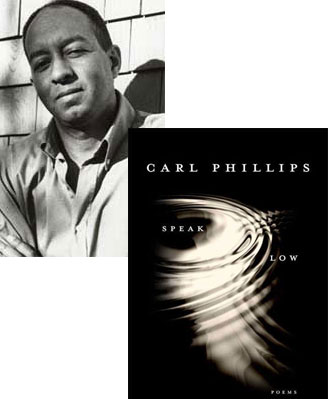Carl Phillips, “In a Perfect World”

Equally, the black lake that the skiff sails across,
and the skiff also. Wingbeat. A belief in evil
having not yet displaced entirely a belief in the power
to turn evil away. Laughter. Any number of small
voices in a field unfolding. Patterns like the one
where arrogance leads to shame, shame to anger,
until from anger—via the suffering called loss, calledgrieving for it: at last, compassion. Hoofbeat. Bluegrass.
Persuasion slowly brushstroking its way back into
what had seemed the world. A shadow prowling
the not-so-clear-anymore perimeter of Who says so?
A single mother-of-pearl stud catching parts of the light—
for now, holding them. Troy is burning. Let us
make of what’s left a sturdiness we can use to the end.
Speak Low is the tenth collection of poems by Carl Phillips, and the first since the publication of Quiver of Arrows: Selected Poems 1986-2006 two years ago. The reference to Troy is just the slightest of many classical allusions in the book—no surprise there, since Phillips majored in Greek and Latin at Harvard and went on to get a master’s in the classical humanities from UMass-Amherst. “The themes that haunt Greek tragedy in particular—those moments when the personal conflicts with what is socially expected of the individual—have turned out to be very much what I am interested in writing about: the flexibility of morality, or perhaps its slipperiness,” Phillips has said. “As for the relevance of classical authors to life and literature today, they wrote about love, death, morality, fear, mortality—these are surely very much a part of contemporary life, given that they are key parts to being a human being.”
Other poems from Speak Low include “Porcelain” and “Naming the Stars.” There’s also “Cloud Country,” which you can hear Phillips reading. Meanwhile, just a week ago, The New Yorker published a new Phillips poem, “Civilization.”
2 April 2009 | poetry |

 Our Endless and Proper Work is my new book with Belt Publishing about starting (and sticking to) a productive writing practice.
Our Endless and Proper Work is my new book with Belt Publishing about starting (and sticking to) a productive writing practice. 
